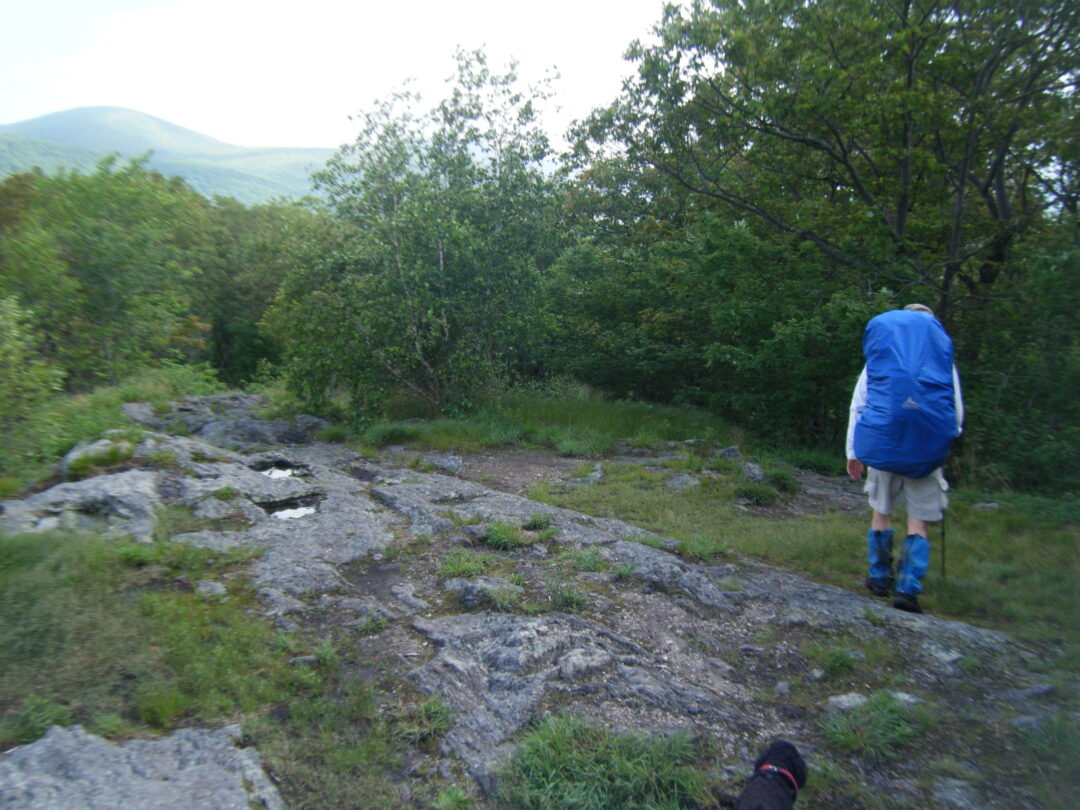 My husband and I were in a bad place one summer, so we left home and went into the mountains for three days. Nat had just had another contract end—the second time in fifteen months. It wasn’t his fault. He worked on yearly contracts, and the economy was bad just then. The old ways of coping with change had led me to a brick wall.
My husband and I were in a bad place one summer, so we left home and went into the mountains for three days. Nat had just had another contract end—the second time in fifteen months. It wasn’t his fault. He worked on yearly contracts, and the economy was bad just then. The old ways of coping with change had led me to a brick wall.
I could not search the job listings for someone else. Hadn’t three decades with him taught me not to do that? Yet I was in despair.
We both knew one thing: we could carry our stuff on our backs up to the Riga Mountain ridge on the Connecticut–Massachusetts border. We could camp.
Weighed down by loss and trying not to say the wrong thing to each other, we pulled the gear off the shelves. It’d been a while since we’d gone together; we found, to our surprise, that during Nat’s purge of old equipment, he’d given away our two-person tent. So we borrowed one. He dragged out an old stove he’d found somewhere—I had my doubts that it would be reliable, but I have always trusted him with the stove. I plotted our route, as I had been doing for many years; he trusted me to do that. He cleaned the water filter. I packed the food. We were used to letting each other do those things.
Of all the things he and I had done together—move five times, raise children, look for work, sit by each other’s sickbeds—backpacking was the one we often did in silence. We had hiked thousands of miles together. I had hiked perhaps a thousand more without him. Of all the places we could start healing, the mountains seemed the obvious choice.
It’s one thing to feel love, even selfless love, but sometimes in life, you have to just shut up and walk. Now, we would do again what we once had loved to do together. So, we parked the car and buried the keys in my pack. Talley, our miniature poodle, sniffed the ground, and we began climbing the steep slope. The rocks were soaked from weeks of downpours. Clouds of mosquitoes followed us. All afternoon, I breathed in rhythm with Nat’s trudging. We camped in a shelter down the ridge from a group of orphan boys in a state wilderness program. They ran over to meet Talley as their leaders stirred huge pots of stew.
The next morning, as I struggled with my big pack, Nat waded in with suggestions on how to load it. I turned toward him, fuming. “I cannot concentrate when you interrupt me like this!” I was yelling.
He backed away. I hyperventilated into my stuff sacks. A few minutes went by. I punched my clothing bag into the bottom of the pack. The lunch bag next. The heavier stove, in its padding, went into the part of the pack that would rest close to my back. As Nat had taught me. I knew he did not deserve my anger. I went over to him and said, “I’m sorry.”
“You don’t need to apologize,” he said.
“Yes, I do,” I said. We had fallen into one of our old habits: trying to meet each other halfway and going farther than that. A marriage counselor once told us that part of our problem was we were too solicitous. However, out there on the ridge, there was no time or proper place to keep up this kind of negotiation. We had to start walking. So we scrambled up to Mount Everett and across the wet rocks of Mount Race. Nat’s muscular legs in their baggy gaiters faded in and out of fog. He picked some blueberries for me at lunch.
Talley climbed so strongly over the slippery treadway that Nat called her the sure-footed mountain goat. The sun began to beam through the mist.
As I walked through the afternoon, it came to me: Be patient. Become the woman you can be.
Our second night out, we met some wonderful young hikers—some thru-hiking the Appalachian Trail—and a ridge-runner, a 26-year-old woman who rallied about six of us to carry an improperly moved picnic table back to where it belonged. We gathered water, lit the stove, set up the tent, and listened to each other’s trail stories.
The peace of chores, which had eluded me in our little house, settled in. Much later, as my husband and my dog slept soundly next to me, I sat up and pulled out my headlamp and notebook. As I always do when camping, I scribbled down some notes (notes that help me write this now). Late at night, I could think about how easily we cooperated out here. I could picture Nat earlier that day, a man I had not seen in a long time-wise, funny, with a bandanna hanging around his ears and a maroon baseball cap on his head.
On the third day, we slid over the slick, worn rocks of the old mountains. The footing was more dangerous than on wet granite, and I knew that the rocks didn’t care. Rocks are like problems that won’t budge. But when you look closely, you realize that both contain cracks and handholds. For Nat and me, the future remained hidden. But I could see a way to get to it.
For weeks after we went home when I closed my eyes, I would see the wet boulders, leaf duff, mud, streams, and cairns. I knew that I could learn to get through and around them in a way that makes sense, in the right time.
The trip had marked the climb up from a low point. The way out would not take us as long as I had feared.
Nat and I went on to finish the northern stretches of the Long Trail. We trudged up to open summits, set up camp, shared food, and talked. A 10-year-old girl hiking the whole trail with her father nicknamed us Mr. and Mrs. Ion: the negative force and the positive force. Mr. Ion and I are two pilgrims on the same long journey.
*******
This excerpt from my book Going Over the Mountain: One Woman’s Journey from Follower to Solo Hiker and Back appeared in the Shore Publishing weeklies, on the Shoreline of Connecticut, on September 12, 2024. This excerpt is about a short backpacking trip I took with my husband, Nat, in the northwest corner of Connecticut and into Massachusetts and about how we used backpacking to heal our difficulties that year.
